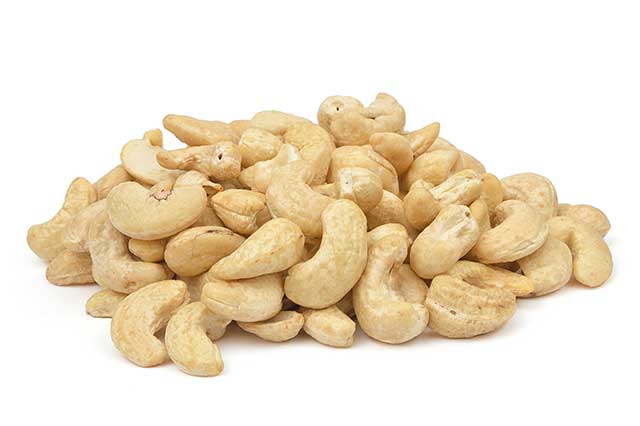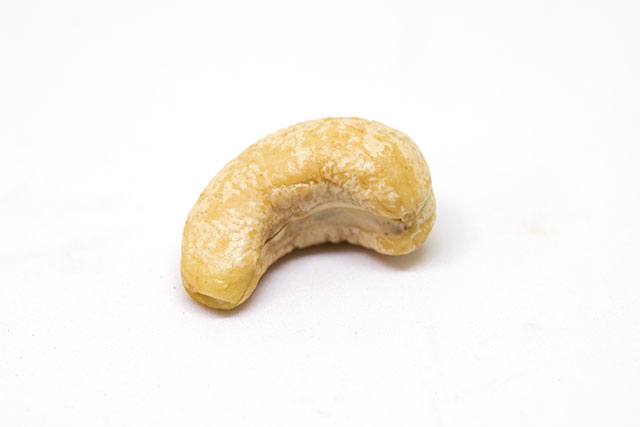Cashew Nuts 101: Nutrition Facts, Benefits, Drawbacks
Cashew nuts are a mild and buttery species of nut native to Central America and the Northern areas of South America, particularly Brazil.
Often referred to as ‘cashews,’ these nuts are the seeds of fruit from the cashew tree (Anacardium occidentale).
In this article, we examine the full nutrition profile of cashews, the benefits they offer, and some potential concerns.
Nutrition Facts
The following tables present the full nutritional values for cashew nuts per ounce (28-gram) serving.
All nutrient data is courtesy of the USDA Food Composition Databases (1).
| Calories/Nutrient | Amount | |
|---|---|---|
| Calories | 156.77 kcal | |
| Carbohydrate | 8.56 g | |
| Fiber | 0.94 g | |
| Sugars | 1.68 g | |
| Fat | 12.43 g | |
| Saturated Fat | 2.21 g | |
| Monounsaturated Fat | 6.75 g | |
| Polyunsaturated Fat | 2.22 g | |
| Omega-3 Fatty Acids | 0.02 g | |
| Omega-6 Fatty Acids | 2.21 g | |
| Protein | 5.17 g | |
| Vitamins | Amount | % DV |
| Thiamin (B1) | 0.12 mg | 10.0 % |
| Vitamin K1 | 9.67 mcg | 8.1 % |
| Pyridoxine (B6) | 0.12 mg | 7.1 % |
| Pantothenic Acid (B5) | 0.24 mg | 4.8 % |
| Choline | 17.28 mg | 3.1 % |
| Folate | 7.09 mcg | 1.8 % |
| Niacin (B3) | 0.30 mg | 1.9 % |
| Vitamin E | 0.26 mg | 1.7 % |
| Riboflavin (B2) | 0.02 mg | 1.5 % |
| Vitamin C | 0.14 mg | 0.2 % |
| Minerals | Amount | % DV |
| Copper | 0.62 mg | 68.9 % |
| Manganese | 0.47 mg | 20.4 % |
| Magnesium | 82.78 mg | 19.7 % |
| Zinc | 1.64 mg | 14.9 % |
| Phosphorus | 168.11 mg | 13.4 % |
| Iron | 1.89 mg | 10.5 % |
| Selenium | 5.64 mcg | 10.3 % |
| Potassium | 187.11 mg | 4.0 % |
| Calcium | 10.49 mg | 0.8 % |
| Sodium | 3.40 mg | 0.1 % |
As shown in the nutrition profile, cashews are a little higher in carbohydrates and lower in fat than most nuts.
They also offer a good range of essential minerals.
Health Benefits of Cashew Nuts
Cashew nuts and the nutrients they contain can offer various health benefits.
Here is a summary of what cashews offer.
1) Rich Source of Healthy Fats
Cashew nuts are a good source of dietary fat. As shown in the nutrition values, they supply 12.4 grams of fat per serving.
More than half of this fat content (6.7 grams) comes from the monounsaturated fatty acid oleic acid (2).
On this note, a large amount of research suggests that oleic acid can have several beneficial health effects (3, 4, 5);
- Oleic acid may improve insulin sensitivity.
- A higher oleic acid intake appears to impact the lipid profile beneficially.
- Diets high in oleic acid demonstrate improvements to markers of metabolic syndrome.
2) High In Magnesium
Magnesium is an essential mineral that has great importance to human health.
Among the mineral’s many functions, magnesium is vital for (6);
- Maintaining a healthy immune system
- Bone health
- Muscle and nerve function
- Forming new bone and DNA
Further research also suggests that magnesium may play a role in lowering blood pressure and regulating blood sugar levels (7, 8).
While it can be challenging to find adequate food sources of magnesium, cashew nuts offer a good amount of the mineral.
An ounce serving—just a handful of nuts—provides close to 20% of the daily value for magnesium (1).
3) Moderately High In Protein
Generally speaking, animal foods such as dairy, meat, and seafood are the best sources of dietary protein.
However, certain plant foods can offer protein too.
While nuts are not one of the most concentrated providers of plant protein, they do offer more than five grams of protein per ounce serving (1).
4) Significant Source of Copper
Cashews are an excellent source of the essential mineral copper.
This important mineral has a crucial role in the immune system, iron metabolism, and gene expression (9).
Furthermore, copper is thought to play a significant role in cardiovascular health.
According to research, a copper deficiency increases the susceptibility of LDL to oxidation, and it may increase the overall risk for cardiovascular disease (10, 11, 12).
Not many foods offer high concentrations of copper, but just one ounce of cashews provides 620 mcg of the nutrient (1).
This amount is equivalent to 69% of the daily value for copper.
5) May Have Benefits For Cardiovascular Health
Several studies suggest that cashew nuts may have certain benefits for cardiovascular health.
First of all, there are two recent randomized controlled trials which demonstrated that a dietary intervention of 28-64 grams of cashews per day could (13, 14);
- Reduce LDL and total cholesterol
- Increase HDL levels
An improved ratio of non-HDL to HDL cholesterol is associated with reduced cardiovascular risk, so this would be a beneficial change (15, 16).
However, it is worth noting that another similar study found that cashew nuts had no impact on markers of cardiovascular risk (17).
A larger evidence-base is necessary to determine these potential benefits more accurately.
6) Moderately High In Zinc
As we have already seen, cashew nuts are high in many different minerals.
Zinc is another of these minerals concentrated in cashews, and one ounce provides 1.64 mg, which is around 15% of the daily value.
Zinc has numerous different functions, and it is particularly important for its immune-enhancing properties.
In other words; zinc helps to fight infections, bacteria, and viruses, and generally helps to keep the human body healthy (18).
On this note, a systematic review and meta-analysis of 17 randomized controlled trials demonstrated that zinc might help to reduce the duration of common cold symptoms (19).
Additionally, a systematic review found that higher zinc intake may have benefits for preventing the progression of age-related macular degeneration. However, the findings were somewhat inconclusive (20).
7) May Help To Lower Blood Pressure
Several studies show that tree nuts may have blood-pressure-lowering properties in general.
It appears that this may be true for cashew nuts too.
For example, a randomized controlled trial featuring 300 adults with type 2 diabetes found that cashew intake had blood pressure benefits.
In this study, consuming 30 grams of cashew nuts per day for 12 weeks in addition to a standard diabetic diet led to a greater decrease in systolic blood pressure than the control diet (standard diabetic diet without cashew nuts) (21).
To be precise, the systolic blood pressure of the participants on the cashew nut diet fell from 125.5 mm Hg to 121 mm Hg.
Potential Concerns and Drawbacks
Similar to all nuts, cashews have some potential side effects that may be an issue for certain individuals.
Allergic Reactions To Cashews
Unfortunately, in some rare cases, cashew nuts can cause severe allergic reactions.
Since the allergens present in cashews are so potent, these allergic reactions can even cause life-threatening anaphylaxis (severe allergic reaction) (22).
Due to the strength of cashew nut allergens, only minimal amounts are necessary to cause adverse reactions (23).
However, this risk of allergic reactions is not unique to cashew nuts. Other true tree nuts such as almonds, acorns, and hazelnuts can also cause severe reactions in this way.
In 2016, there were 6,937 diagnosed cases of tree nut anaphylaxis in the United States. Approximately half of these individuals tested positive for cashew nut allergy (24).
Also, anaphylaxis from cashew nut allergy is more common than anaphylaxis from peanuts (74.1% to 30.5% of cases) (25).
Cashew Nuts Are High In Oxalates
One more potential drawback of cashew nuts is their high concentration of oxalates (oxalic acid).
Oxalates are relatively common in plant foods, but cashew nuts contain a significant amount (26).
While usually not an issue for healthy people, excessive intake of oxalate can occasionally cause problems for people with kidney issues or those at risk of developing kidney stones (27, 28).
In some instances, case studies show that cashew nuts have led to decreased kidney function. In one example, a 63-year old woman suffered from a progressive decline in kidney function that improved after she stopped consuming cashews (29).
Cashew nuts contain roughly 260 mg of oxalate per 100 grams. Most prescribed low-oxalate diets contain less than 50 mg of oxalate per day.
Final Thoughts
In summary, cashew nuts are a reasonably nutritious nut that provides a good source of fat and minerals.
For this reason, a small serving of cashews can add a lot of beneficial nutrients to the diet, and they’re one of the healthier “snack” options.
As a bonus, these nuts taste delicious too.
For more on nuts, see this guide to the little-known pili nut.


